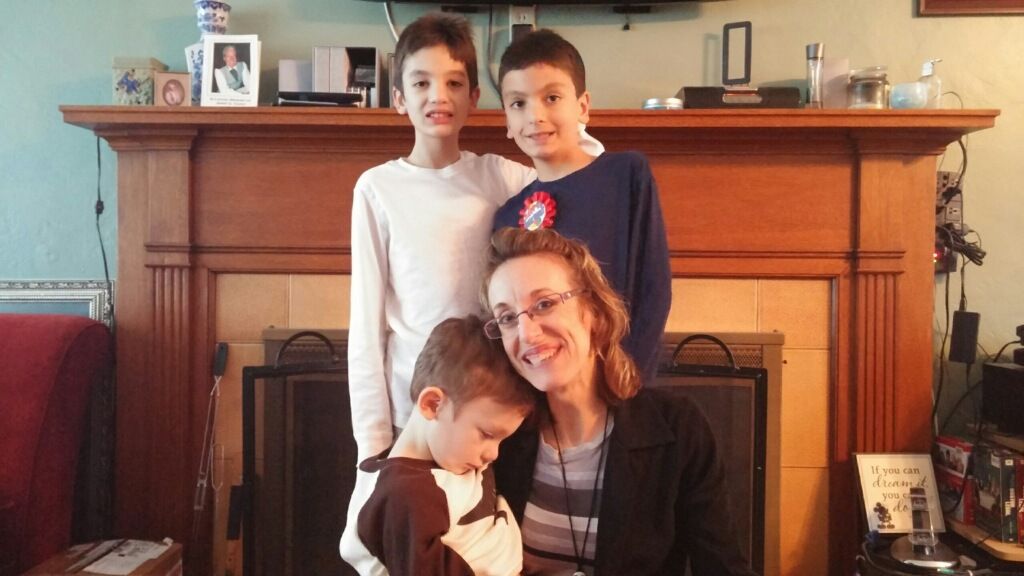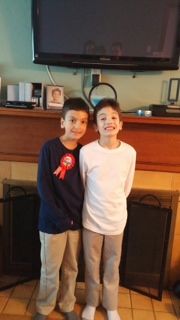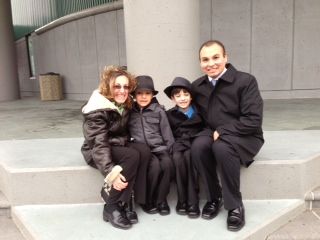
Imagine solo-parenting three active boys under the age of 7, the youngest two with autism, while your husband is on active duty in Afghanistan. That was the reality for Navy veteran Michelle Pritchard in 2007 when her family was transferred to Bremerton.
“Going to the grocery store was nearly impossible. Nicholas and Gabriel wouldn’t sit in the cart and would wander off. The only help I had was my 7-year-old son Christopher. He had to be dad and it wasn’t fair to him,” Michelle remembers.
Michelle was determined to get help – respite care and therapy – for her boys and other military families living with autism. Their journey eventually led them to turn to WAAA for help.
“I met with legislators, talked to the right people and my story became pretty well known,” Michelle said.

Eventually she had a two-hour meeting with the Secretary of the Navy along with eight other families struggling with autism and the need for respite care. Soon after, the Navy developed their respite care program. The Pritchards were approved for 40 hours a month of respite care. In 2008, the military insurance provider, TriCare, approved coverage for Applied Behavior Analysis (ABA) therapy.
ABA therapy makes big difference
“The ABA therapist worked with the boys on taking a shower. She got them used to how things feel. It helped them get over anxiety about things like trimming nails and putting on a Band-aid,” Michelle said.
Setting up cubbies for different types of clothing helped the boys learn to get dressed with by themselves.
Three years ago, Michelle and her husband Shawn resigned from the Navy.
“We have a good structure at home and all sit down for meals together. Both of us are home a lot and we can parent together. It’s a big blessing to us.”
However, the transition to civilian life has been a challenge. They had to find civilian jobs and insurance that would cover the boys’ needed therapies.
Like many other families living with autism, it has been a battle to get coverage approved for ABA therapy. Michelle reached out to WAAA to find help.
WAAA helps family get Group Health coverage for ABA therapy
In 2013, the family had Group Health coverage and was finding it impossible to get a spot for ABA therapy with an in-network provider in Kitsap County. They had been waiting for over a year for an opening.
Michelle contacted Trish, a WAAA advocate.
“I talked with Trish a lot. I was so frustrated because I had already gone through this with the military. Going through it all again, it was so hard.”
Trish helped Michelle write a letter to Group Health and gave her sample language to use. After she sent the letter, Group Health responded in 5 days. They were able to pick a provider in Kitsap and it was approved.
Both boys are seeing lots of success in adapting to the world thanks to therapy and hard work. Michelle notes that 10-year-old Nicholas has made great progress in problem solving.
Recently, he was able to guide his younger brother Gabriel to get off at the correct bus stop and follow his mom’s instructions for waiting in a certain spot until she arrived to pick them up.
“I’m seeing wonderful things. Nicholas tells me, ‘Mom, I know how to rinse my hair.’ This is a huge deal. He had so many sensory things going on. In the past he couldn’t put his head under the shower nozzle. He couldn’t get his hair cut without screaming. Now he can rinse his hair by himself,” Michelle said.
Michelle’s advice is to find your child’s gifts and expand on those rather than concentrating on the autism diagnosis.
For 8-year-old Gabriel, one of his gifts is memorization. His mom uses flashcards to teach him reading rather than a phonics- based approach.
“I am feeling very good about the future. There are days that I worry about how they’ll live an independent life when they’re grown up. I want my kids to be taken care of.”
Michelle now works with adults with disabilities to help them find jobs.
“I am so concerned about supports for adults. These adults mostly haven’t had access to ABA therapy. I feel our kids are very fortunate to have that therapy. It’s made a huge difference.”
“I want parents to be educated and not think an autism diagnosis is the end of the world. We are seeing good results come out with different interventions.”




